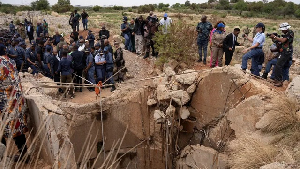Mr Robert Adatsi, the Deputy Director of Health, Clinical Services, Volta Region, has suggested that the Commission on Human Rights and Administrative Justice (CHRAJ) extended its basic human rights training to the nursing training schools.
He said this would improve the dwindling image the Ghana Health Service (GHS) now suffering incessant bashing from clients and other service users over the bad client ties.
He said the barrage of criticisms was ripping-off the corporate image of the GHS, the main provider of health services in the country.
Mr Adatsi was speaking at the passing-out of 298 diploma nursing students of the Ho Nursing Training College who were trained in Basic Human Rights.
Mr Adatsi said he had tasted the bad behaviours of personnel in some of the health facilities when he randomly visited those places undercover.
He said management had tried many interventions including training in customer care, quality improvement and assurance bits, to no avail.
Mr Adatsi said the training must extend to all other schools, allied and health sciences, as part of the curricula adding that nurses as professionals were not the sole culprits.
Mr Richard Quayson, the Acting Commissioner of CHRAJ, expressed regret at the “dying spirit of selflessness in Ghana,” where currently, for many, the push factor in rendering service was the gains that would accrue.
He said there appeared to be shortage of caring professionals in the hospitals these days.
Mr Quayson said the right to health was guaranteed by national and international human right laws as very fundamental to the attainment of other human right goals.
He said: “The noble profession of compassionate care exemplified by the selflessness of Florence Nightingale is somewhat losing its pristine image because of the bad behaviour of some caregivers.
“Many have had their conditions aggravated, with some losing their lives due to recklessness, negligence, insensitivity and even outright callousness of some health professionals.”
Mr Quayson said the programme, piloted at the Cape Coast Nursing and Midwifery Training School, in collaboration with the GHS in 2004, now run in 12 health institutions nationwide with around 3,000 nursing trainees and 39 tutors trained so far.
He said CHRAJ was reviewing the course to include issues of conflict of interest, code of conduct and integrity.
Mr Daniel Mensah, the Volta Regional Director of CHRAJ, said the course involved observation at the wards as well.
He said some 30 students were not given certificates because they could not meet the requirements of attendance and submission of assignments.
Bennett Bliss Ahiable, in charge of Public Education at CHRAJ, Volta Regional Office, and a facilitator, said the students were taken through the Patients Charter, Labour Law, Sexual Harassment and Deportment.
The chairperson for the programme, Mama Sewa Fenu, III, Queen of Taviefe in the Ho Municipal Area, who shared an experience she had at a public health facility in the Volta Region, said her complaints of excessive pain after surgery was rudely parried by a nurse saying; “I am not God to assuage your pain”.
Health News of Monday, 30 May 2016
Source: GNA
















